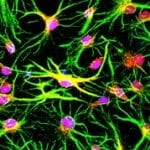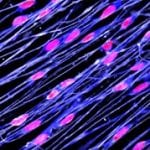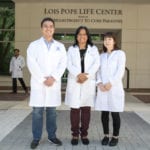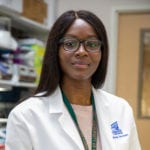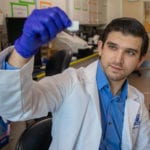Mousumi Ghosh, Ph.D.
Research Associate Professor, Department of Neurological Surgery
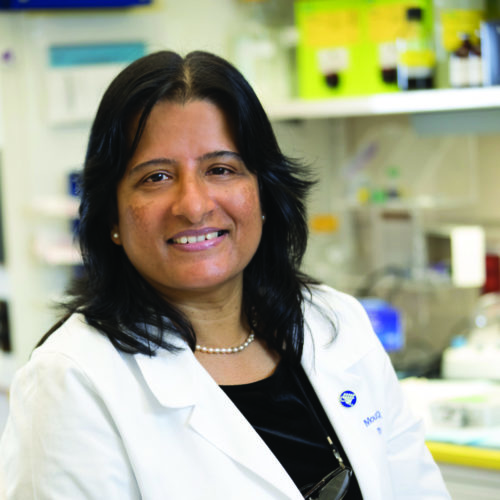
The Miami Project to Cure Paralysis
1095 NW 14th Terrace (R-48)
Miami, FL 33136
(305) 243-9846
Biography
Research Interests
Areas Of Research
Publications
More
Dr. Mousumi Ghosh, a native of India, holds her bachelors and Masters degrees in Chemistry and Microbiology from the University of Poona, India. While an undergraduate, Dr. Ghosh became interested in academic research and graduated with a Ph.D. in Biochemistry in 1997 from University of Calcutta, India. Dr. Ghosh’s postdoctoral training focused on studying cell-signaling mechanisms and protein-protein interactions, both at the molecular and structural level, between the heterotrimeric G proteins and their downstream signaling targets at the University of Rochester, NY, under Prof. Alan V. Smrcka.
Since joining The Miami Project in 2007, initially as a postdoctoral associate with Prof. Damien D. Pearse, she developed a keen interest in developing molecular and pharmacological methods for altering glial cell reactivity and cell-to-cell interactions in response to CNS injury or disease to promote neuroprotection and repair. During this time Dr. Ghosh investigated; 1) the surface modification of Schwann cells to enhance their capacity for migration and axon regeneration following transplantation within the injured spinal cord; 2) microglia phenotypic conversion to alter their inflammatory to reparative properties and; 3) the manipulation of intracellular signaling pathways in astrocytes to abrogate their reactivity and production of axon growth inhibitory matrix molecules, including chondroitin sulfate proteoglycans.
Dr. Ghosh’s research in spinal cord injury repair was recognized by The Sam Schmidt Paralysis Foundation and The American Spinal Injury Association through The Outstanding Young Investigator Award given to her in 2009. In July 2014, Dr. Ghosh joined the faculty in the Department of Neurological Surgery and The Miami Project to Cure Paralysis as a Research Assistant Professor.
Altering Host Glial Responses Following CNS Injury and Disease to Promote Repair
One of the major research areas of Dr. Ghosh’s laboratory is to explore the potential benefits of glial cell-derived exosomal vesicles to promote neuroprotection and axon growth using cell-based assays and in experimental rodent models of spinal cord injury. One prime focus of Dr. Ghosh’s lab research centers on modulating microglial cells using pharmacological and molecular approaches so that the exosomes they generate can be used to deliver neuroprotective and neurogenic cargoes to injured or diseased neural cells.
Dr. Ghosh’s laboratory is actively investigating the pathomechanisms associated with aberrant dysregulation of Transglutaminase-2 (TG2) in spinal cord injury and neurodegenerative conditions such as Multiple Sclerosis. To achieve this, she is using selective inhibitors of TG2 binding or activities or cell-specific TG2 knockout transgenic lines to improve our understanding of the cell-specific functions of TG2 in neurological disease and injury.
Dr. Ghosh’s laboratory is also interested in exploring the role of versatile kinases, like P38 MAP Kinase, and critical transcription factors, such as NFkB, as underlying effectors in the generated dichotomy of differential responses of males and females to spinal cord injury, particularly as it relates to the innate immune response.
Dr. Ghosh’s long term research goal is to make advances in scientific knowledge within the fields of Neuroimmunology and glial cell biology and to identify therapies that may improve the lives of people with neurological diseases and injury.
Current Lab Projects include:
- Exploring the potential of glial cell-derived exosomes for protection and repair after spinal cord injury
- Targeting of Transglutaminase-2-extracellular matrix interactions as a therapeutic strategy in spinal cord injury and neurodegenerative conditions like Multiple Sclerosis
- Identifying sex dependent disparities in the central innate immune response in rodent SCI and MS models
- Understanding the link between the immune response and the development of central neuropathic pain after spinal cord injury
Visit Dr. Ghosh’s Publication Listing
News Stories
Reducing Damage After Spinal Cord Injury (The Project Fall 2017)
PROFESSIONAL AFFILIATIONS/MEMBERSHIPS
American Society for Neural Transplantation and Repair (ASNTR)
Society for Neuroscience (SfN)
CURRENT LAB PROJECTS INCLUDE:
- Exploring the potential of glial cell-derived exosomes for protection and repair after spinal cord injury
- Targeting of Transglutaminase-2-extracellular matrix interactions as a therapeutic strategy in spinal cord injury and neurodegenerative conditions like Multiple Sclerosis
- Identifying sex dependent disparities in the central innate immune response in rodent SCI and MS models
- Understanding the link between the immune response and the development of central neuropathic pain after spinal cord injury
CURRENT LAB MEMBERS
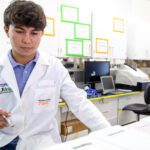
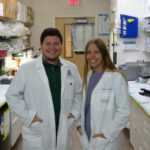
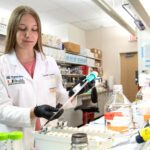
PAST LAB MEMBERS


